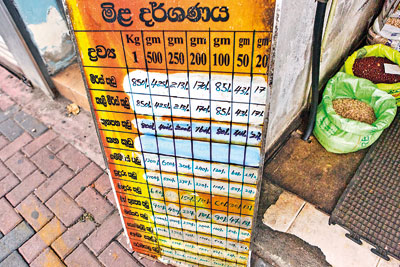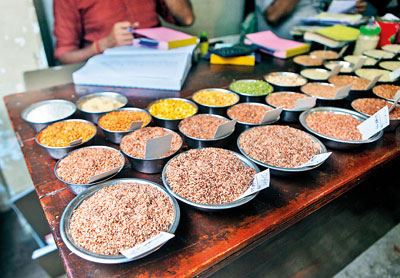News
New levy on essential goods sends prices soaring
 Prices of essential items have started rising after the Government imposed taxes on a range of items, claiming the move would boost local cultivation and curb imports.
Prices of essential items have started rising after the Government imposed taxes on a range of items, claiming the move would boost local cultivation and curb imports.
The price of palm oil, margarine, sugar, canned fish, imported chillies, garlic and potatoes increased directly after the imposition of the Special Commodity Levy on such goods.
Margarine tripled in price with a levy of Rs. 650.
The Rs. 50 levy on canned fish, sardines and sprats has been doubled.
The higher costs are hurting people on low incomes as well as merchants trying to resurrect business following the two-month curfew.
A senior government official said the government should make contingency plans to restart imports if shortages occurred in the markets.
He said imposing taxes on items that were not cultivated locally, such as masoor dhal and bombay onions was impractical, and also that the government should rescind the levy until the next harvest.
The Sunday Times found that when the government relaxed taxes on tinned fish and dhal during the first weeks of the pandemic, causing prices to drop, merchants created artificial shortages of these goods, forcing the maximum retail prices (MRP) to be raised again.
On March 17, the Consumer Affairs Authority (CAA) issued MRPs of Rs. 65 a kilo for mysoor dhal and Rs. 100 for a 400g tin of fish. Tinned fish thereafter disappeared from shelves, leading the CAA to abandon the new MRPs on April 30.
Currently, masoor dhal is Rs. 160 a kilo while tinned fish is Rs. 260.
The Government has shown itself to be unable to maintain the price controls it imposes, observed retiree H. Silva, 90, a resident of Battaramulla: when price controls created an artificially-created shortage the government retreated from lowered prices.
Last week, the Government retreated from setting a lowered maximum retail price on five varieties of rice when manipulated rice shortages resulted.
CAA Chairman (Rtd) Major-General Shantha Dissanayake said the subsequent raising of rice prices was aimed at restoring rice supplies to consumers.

The list shows upwards revision of prices of grocery items. Pix by Sameera Weerasekera
He said that prior to April the price of nadu and samba rice was Rs. 98 and there were no controls on kekulu and keeri samba at that time, those varieties were selling at prices above Rs. 120.
“The Government, during the early stages of the pandemic time, reduced the price of nadu and samba to Rs. 90 and kekulu to Rs. 85 per kilo. The price of keeri samba was also set at Rs. 125 per kilo on April 10,” he said.
Millers then pleaded that they could not produce rice at these prices.
The Government thereupon revised prices to Rs. 96, Rs. 98 and Rs. 120 respectively for nadu, samba and keeri samba rice and Rs. 93 for red and white kekulu rice.
“The revised prices are still lower than pre-pandemic rice prices,” Maj-Gen. Dissanayake pointed out.
The CAA is taking action against poultry product merchants for selling chicken at prices exceeding the maximum retail price, CAA Deputy Director Asela Bandara said.
Broiler chicken should be sold for a maximum of Rs. 430 a kilo and Rs. 500 a kilo for skinless chicken but merchants were charging Rs. 650-700. Mr. Bandara said outlets had been raided and stern action was being taken against shops that sell goods exceeding controlled prices.
The Sunday Times was told the Government-imposed halt on corn imports has affected local chicken feed prices, with merchants holding back local corn stocks to create higher prices.
Referring to this week’s Special Commodity Levy on food products, Hunupitiya shop-keeper Egodagamage Dias Premaratne said business had crashed due to the pandemic and it was unfair to tax people in difficult times.
“People can see the differences in prices before the pandemic hit, and afterwards,” he said.
Dhal, which cost Rs. 130 a kilo before the pandemic, is now Rs. 160 and onions, which were Rs. 60, are now Rs. 100, Mr. Premaratne said. Sugar had risen from Rs. 115 to Rs. 140.

Although rice prices have gone up in recent weeks, the CAA says they are lower than the prices before the pandemic
He pointed out that such increases were particularly detrimental to people on daily wages such as coconut pluckers, garden cleaners and housemaids who could not find work during the curfew and are in financial hardship.
Another shop owner, H.C. Kamalawathie in Wattala, said the new tax on margarine had created an acute shortage of this product, and coconut oil had gone from Rs. 280 to Rs. 525.
“Non-essential items too would increase in price as some products are made using essential items,” she added.
Bakery owners also warned of future price increases of bakery products. The President of the All-Ceylon Bakery Owners Association, N.K. Jayawardena, said he had written to the President, Prime Minister and other officials requesting a review of the taxes.
“Most bakery products are made using palm oil, margarine, sugar and eggs, so currently we are facing losses,” he said.
The President of the Essential Food Commodities Importers and Traders Association (EFCITA), G. Rajendran, said members supported the government’s policy of self-sufficiency by promoting local cultivation.
He said although there would be shortages of essential items in the next two months while merchants moved from imports to local products, this would be short-lived as farmers would begin increasing local cultivation.
He warned, however that this dynamic would not resolve shortages of turmeric, which has also had the new tax imposed on it. This was because locally-produced turmeric was in insufficient supply and took 10 months to grow to harvest.
Mr. Rajendran pointed to a black market operating for turmeric, where a kilo of the spice cost Rs. 2,000, and revealed some importers were secretly bringing it into the country hidden among other products.


